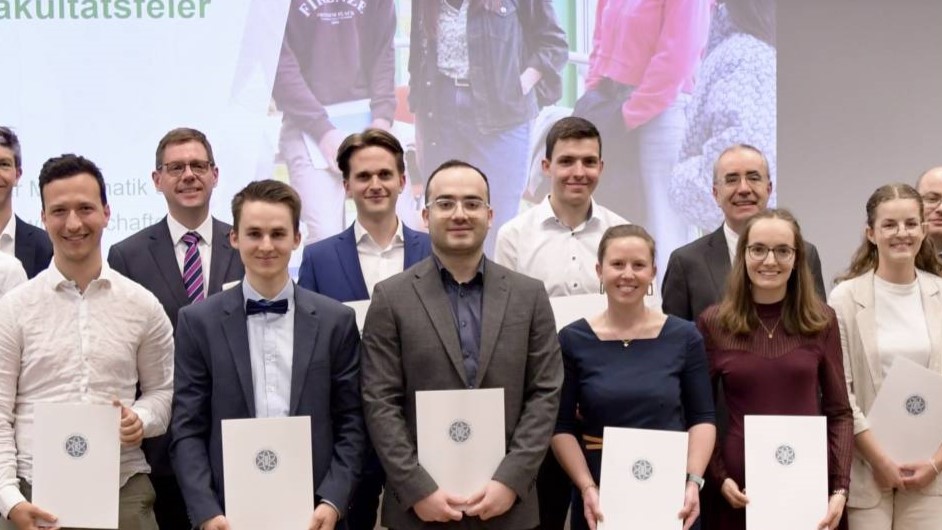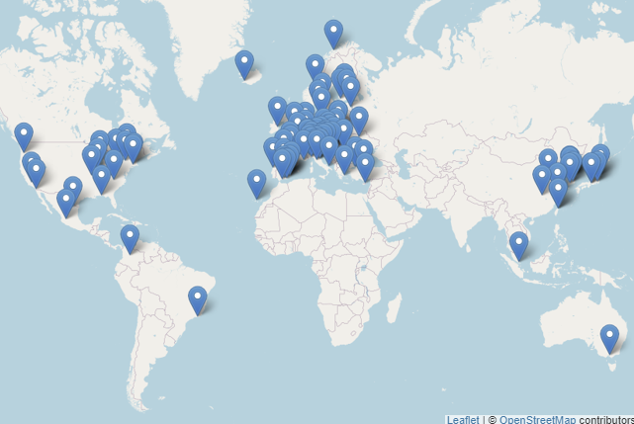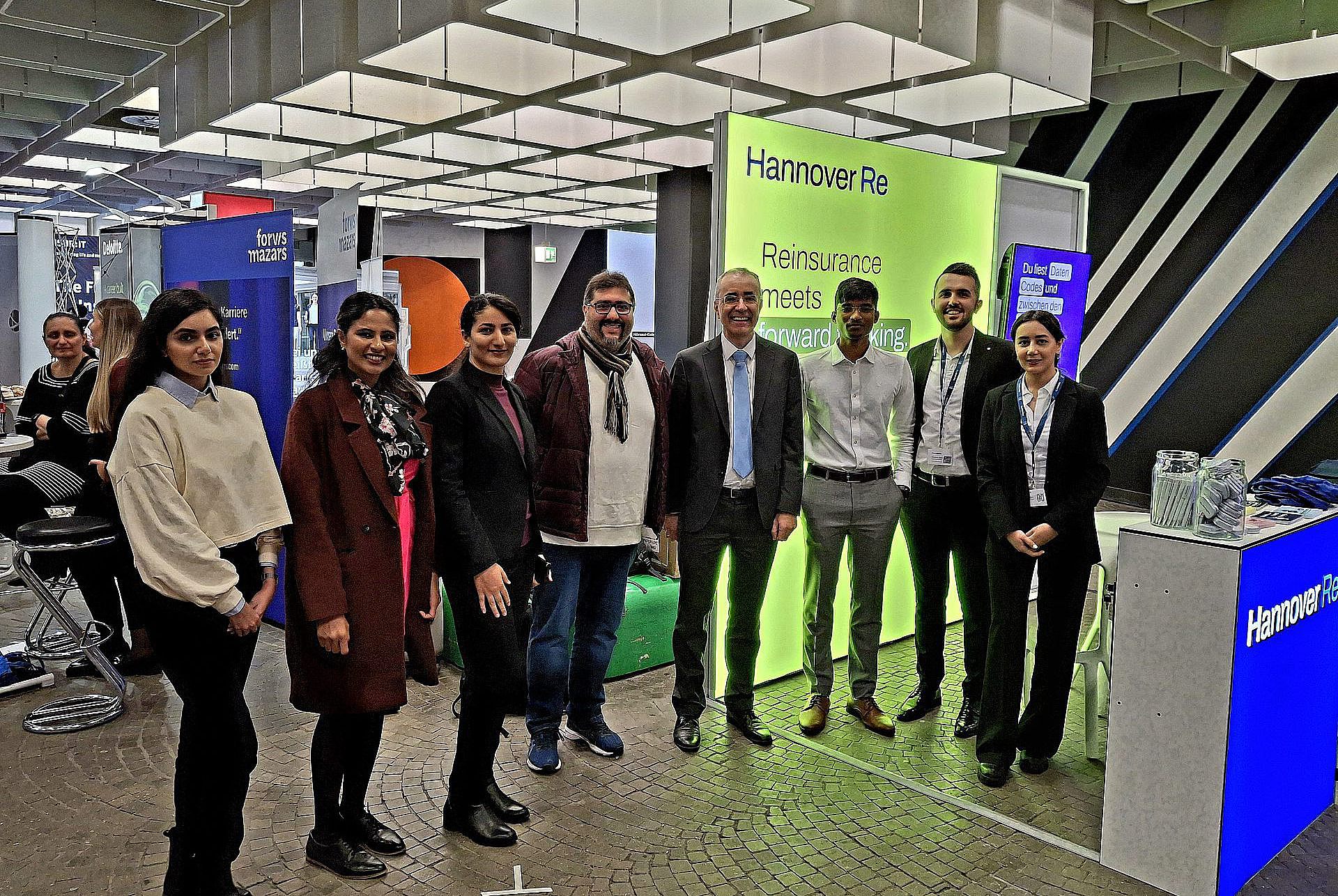Learn in small groups
Our professors are dedicated to teaching and to sharing their knowledge.
This works best in small groups.

The program combines quantitative methods with practical applications to prepare you for a career in finance. After the first semester, you can choose to specialize in Actuarial Science, Financial Economics or Financial Mathematics. Coursework begins with foundation courses, which also enable students without a finance background to study this program. Other courses are designed to practice modern financial techniques and to develop research and presentation skills. Example applications are risk management, pricing of insurance products and trading. We regularly update course content to reflect changing issues and trends, such as artificial intelligence, climate risk or cryptocurrencies.
Master of Science (M.Sc.)
120
4
May 2025: The annual faculty celebration took place on Friday, 16 May 2025. The award for the best graduate of the MSc Finance was presented to Mr. Seyyed Reza Majidi Zavie. He began his studies at Ulm University in October 2022. In 2024, he joined Allianz in Stuttgart as a senior analyst in analytics and portfolio management. Congratulations on the excellent academic achievement and many thanks to Sparkasse Ulm for sponsoring the award!
Read more news in our News Archive.

Our professors are dedicated to teaching and to sharing their knowledge.
This works best in small groups.
Elective modules allow students to choose from a wide range of lectures assigned to specific areas, such as Actuarial Science, Financial Economics, Mathematics and Quantitative Methods. Students therefore have a diversified set of lectures to choose from, which can be found in the module handbook.
Among employers, Ulm University has an excellent reputation for well-trained finance students. One proof of this is the annual career fair at Ulm University, in which around 50 companies participate. It is an excellent opportunity to talk to companies about an internship or a job.
Many of our students who come from abroad to study in Ulm decide to stay in Germany and find jobs in Germany's financial centres like Munich, Frankfurt, Stuttgart or Düsseldorf. For some of the jobs offered in Germany, employers expect graduates to have a good knowledge of German. However, many of our students have secured such jobs even though they had no knowledge of German when they arrived - they have learnt German through the language courses we offer.
Application (online) is possible from February to March 15, 2025 for a study start in October 2025. Key requirements are:
For the the full list of requirements and application documents and the online application portal visit the webpage of the admissions department.
Support for applicants
Support for newly admitted students
We provide information and practical assistance with formalities (residence permit, health insurance, etc.)

Given that Ulm is not a financial center, how can Ulm University provide a perfect preparation for a career in finance?
Students at Ulm University can apply for one or two semesters abroad at numerous universities, both throughout Europe as part of the ERASMUS program and outside Europe. Internships abroad and master's theses at other universities are also possible.
Ulm University has exchange agreements with over 100 universities in 26 countries.
For students in the MSc Finance, the following exchange programs are of particular interest:
The unique exchange program with US universities run by our faculty. Students can go there for one year and earn a Master's in Statistics or Mathematics.

Read more testimonials here.
Tobias, from Germany, now a consultant
What I liked most about the Master in Finance program in Ulm was not only the great support from the institutes, but also the practical applications of quantitative topics as well as the large selection of topics in the curriculum for personal interest and further development.
Sirui, from China, now studying for a PhD
Studying at Ulm University has always been one of the best experiences to me. In my view, this is a great place where excellent faculty and brilliant students meet.

In finance, formulas can be pretty useful.

Have fun working with data.

Students and alumni at the annual career fair.
Video about the MSc Finance
Video about Ulm and Ulm University
Key information summarized in our brochure.
Career Perspectives
Many of our graduates go on to work for global players in banking or insurance. Employers of MSc Finance graduates include: Bank of America, Allianz, KPMG, Deutsche Bank, Goldman Sachs, UniCredit, Bank of China, and many more.
Others work for consulting firms, particularly ones focusing on risk management and the financial industry, central banks, financial regulators or in the finance departments of non-financial firms. Some of our graduates also go on to do PhDs.
According to a recent survey, 100% of our graduates found a job within 6 months of graduation.
Christopher, Bank of America Merrill Lynch
The MSc Finance program in Ulm has the capacity to equip students with the knowledge and skills necessary for a successful career in the financial industry. The flexible structure and wide range of courses offer numerous directions of specialization, and an invaluable cultural experience is obtained through studying with colleagues from across the globe.
Ulm, the birthplace of Albert Einstein, has plenty to offer in terms of leisure activities. The city is beautiful and cosy, yet full of life. You can meet your friends in one of the many cafes, pubs or parks. Events such as the Nabada (carnival on the river) and the International Danube Festival (food, craft and music) will get you up and about in this medieval city of quaint alleyways and lush green parks.
Last step: If you answer many of the following questions in the positive, the MSc Finance may be the ideal program for you:
Are you interested in applying quantitative methods, mathematics and statistics to real-world problems?
Are you curious about the world of finance?
Do you enjoy programming?
Do you enjoy working in an international environment?
Did you do get above average grades in mathematics and statistics in your Bachelor's degree?
Yes? Apply
Questions remaining? Online information session
